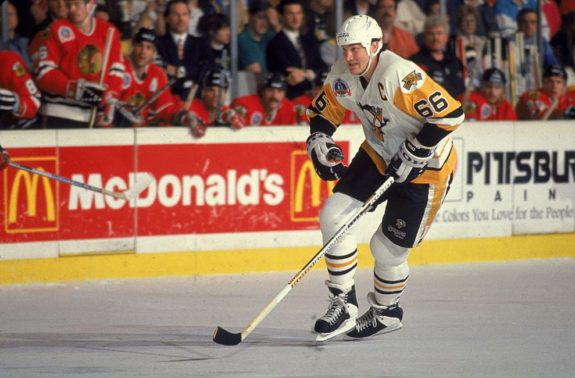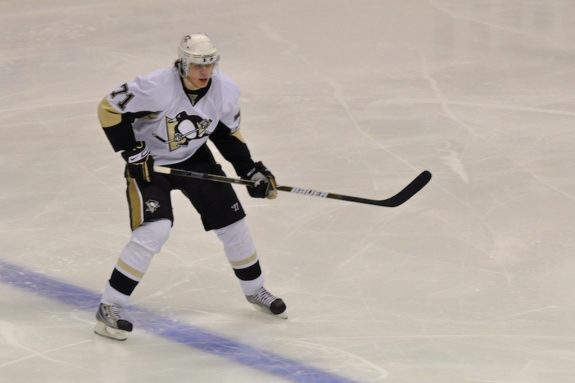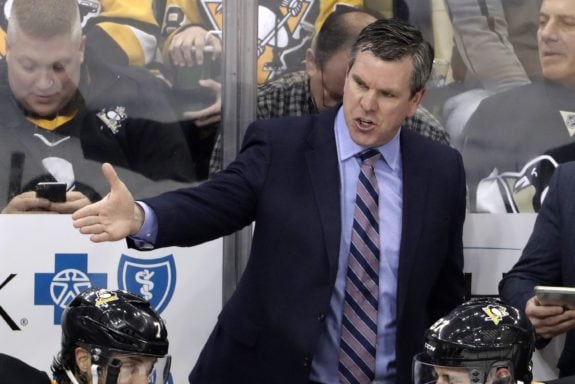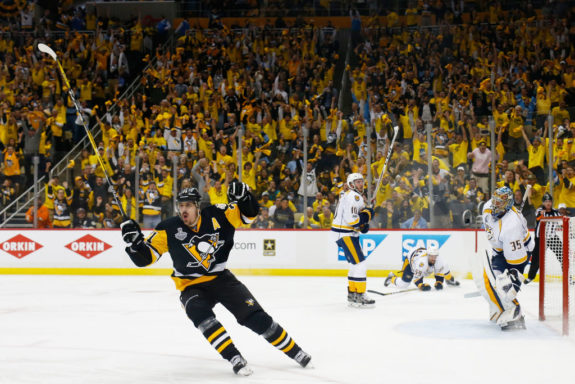The ’12 Days of Christmas’ is a classic holiday song first published in its current form in 1908. In a nod to the classic carol, join The Hockey Writers as we count down the 12 Days of Hockeymas. Each day, we will provide you with a piece of hockey history as we eagerly await the start of the 2020-21 NHL season.
There has been no better team in the NHL since 1990 than the Pittsburgh Penguins. Their five Stanley Cups in that time span ranks atop the rest of the league. The Penguins also became the first team in the Salary Cap era to clinch back-to-back Cups in 2016 and 2017.
It has been quite the ride these past 30 years, so let’s relive the five Stanley Cup wins.
1990-91 – Defeated Minnesota North Stars, 4-2
The Penguins really hit their peak for the first time in franchise history in the late ’80s and early ’90s. With additions like Paul Coffey, Bryan Trottier and Ron Francis, the Penguins geared up to make a deep playoff run on the shoulders of Mario Lemieux and the exciting rookie Jaromir Jagr.
The additions, along with the coaching of the legendary “Badger” Bob Johnson, allowed the team to capture the Patrick Division title before climbing to the Stanley Cup Final for the first time in franchise history with series wins over New Jersey, Washington and Boston.
The Penguins met up with the Minnesota North Stars and were downed in Game 1, 5-4, before Lemieux carried the Penguins in Game 2 on the strength of an outstanding goal.
Dave Gagner, Bobby Smith and Gaetan Duchesne each scored for Minnesota in a 3-1 Game 3 win, but Pittsburgh took the next three games, including an 8-0 Game 6 rout to notch the first Cup in franchise history.
Lemieux took home the Conn Smythe Trophy with an incredible 16 goals and 28 assists in 23 playoff games.
1991-92 – Defeated Chicago Blackhawks, 4-0
In August of 1991, Johnson suffered a brain aneurism and was hospitalized for months. On Nov. 26, Johnson passed away, leaving the hockey community, and the defending Cup champs devastated.
Scotty Bowman took over as bench boss and led the Penguins to become the highest-scoring team in the league. The organization had five 30-goal scorers and finished third in the division to set up a first-round matchup against the Washington Capitals.

The resilience in this Penguins’ team was evident in almost every round as the team battled back from down 3-1 in the first round against Washington.
And it was on display in the first game of the Stanley Cup Final. Down 4-1 to Chicago in Game 1, Jagr had probably the goal of his career, weaving through the Blackhawks’ defense and beating Ed Belfour.
The goal sparked one of the best comebacks in Stanley Cup Final history and the Penguins carried the momentum to sweep the Blackhawks for their second title in team history.
Lemieux, despite missing a portion of the playoffs after Adam Graves’ slash, collected his second Conn Smythe — deservedly so as the captain tallied 16 goals and 34 points in just 15 games. He piled up 78 points in two playoff runs, which ranks second behind Wayne Gretzky’s 82 points in 1984 and 1985.
2008-09 – Defeated Detroit Red Wings, 4-3
In the early years of Sidney Crosby’s career, the Penguins made back-to-back trips to the Stanley Cup Final, both against the Detroit Red Wings. Although Detroit hoisted the Stanley Cup in Pittsburgh in 2008, the young Penguins squad learned priceless lessons from that season that helped the team make it back the following year.
Pittsburgh was carried to the Final on the outstanding play of Evgeni Malkin, who piled up the largest point total since Gretzky in 1993 with 36 points.

However, things did not look good for the Penguins early on, as the Red Wings took the first two games of the series. In Game 3, the Penguins scored three unanswered goals to climb back from down 2-1. Pittsburgh once again came back from down 2-1 to score three unanswered goals in Game 4, powered by Jordan Staal’s shorthanded goal, as the Penguins evened up the series, 2-2.
Detroit routed Pittsburgh, 5-0, in Game 5 before a pair of goals from Staal and Tyler Kennedy in Game 6 kept the Penguins’ hopes alive for a Game 7. Then came the heroic performance of Maxime Talbot in Game 7. The unlikely hero netted both of the Penguins’ two goals in the series-deciding game and a desperation save by Marc-Andre Fleury in the final seconds clinched the third Cup in team history while becoming the second team in league history to win a Stanley Cup after losing the first two games.
2015-16 – Defeated San Jose Sharks, 4-2
The gap between the Penguins’ third and fourth Cup can, in my mind, be blamed on Crosby’s concussion issues and the domination of the Blackhawks and Kings.
Nonetheless, Pittsburgh made it back to the dance against the San Jose Sharks on the strength of a fast-tempo style of play implemented by head coach Mike Sullivan, who replaced Mike Johnston midway through the season, and exceptional play by rookie goaltender Matt Murray.

With Game 1 tied at 2-2 midway through the third period, Nick Bonino netted the game-winner at the 17:27 mark that gave Pittsburgh a 1-0 series lead. In Game 2, the two teams went to overtime deadlocked at a 1-1 tie before Conor Sheary had the first signature moment of his career with an overtime winner.
Joonas Donskoi’s overtime winner in Game 3 gave San Jose its first win of the series until Matt Murray held the Sharks to one goal in Game 4 to give the Penguins a 3-1 series lead the opportunity to clinch their first Cup on home ice. Game 5 was a barnburner early on in the first period with five goals, allowing the Sharks to take a 3-2 lead at the end of one. San Jose held on to that lead the rest of the game.
Brian Dumoulin opened the scoring in Game 6 and a goal by Logan Couture tied things in the second period. Just over a minute later, Kris Letang beat Martin Jones from below the circle.
The Penguins, with the help of an empty-netter by Patric Hornqvist, held on to hoist the Cup. It was the first time since 2011 that the Blackhawks or Los Angeles Kings did not win the Cup.
2016-17 – Defeated Nashville Predators, 4-2
The 2016-17 season was the 50th season for the Penguins — and boy, was it a good one. Crosby amassed 44 goals during the regular season while Malkin collected 33 as Pittsburgh finished with a record of 50-21-11.
After ousting the Columbus Blue Jackets in five games, the Penguins went seven games with the Presidents’ Trophy-winner Capitals and then the Ottawa Senators to meet the Nashville Predators in the team’s sixth Stanley Cup Final appearance.

Game 1 was a back-and-forth shootout as the two teams were tied at 3-3 with under five minutes left in the third. Jake Guentzel, who was coming off a breakout rookie season, found the back of the net on Pittsburgh’s first shot since the first period to help give the Penguins a 1-0 series lead.
After Nashville took a 1-0 lead in Game 2, the Penguins scored four unanswered goals to take a 2-0 series lead. The roles were reversed in Game 3, however, as Nashville scored five unanswered goals to overcome a 1-0 deficit and clinch its first Stanley Cup Final game win in franchise history.
The Predators evened the series at 2-2 as Pekka Rinne stopped 23-of-24 shots in a 4-1 win before Rinne’s counterpart Murray answered with a 24-save shutout in Game 5. Game 6 remained scoreless for the majority of the contest until Hornqvist found space behind Rinne from below the goal line to tab the eventual game-winner.
Crosby was named the Conn Smythe winner for the second consecutive year as the Penguins notched the first back-to-back Cup in the salary cap era. Sullivan also became the first American-born coach to win multiple Cups.
Pittsburgh will likely be in a tough division after the proposed realignment, making the road to the franchise’s sixth Stanley Cup that much harder in 2020-21.
Stay tuned to The Hockey Writers as the 12 Days of Hockeymas continues with the Penguins’ four goalies with 100-plus wins.